DCPA NEWS CENTER
Enjoy the best stories and perspectives from the theatre world today.
Enjoy the best stories and perspectives from the theatre world today.
Richard Thomas, who plays Atticus, and Jacqueline Williams, who plays Calpurnia, discuss playing two of the most beloved characters from Harper Lee’s To Kill a Mockingbird.
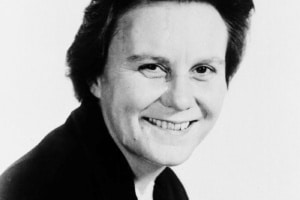
Harper Lee. Photo by Corbis
In Harper Lee’s celebrated novel To Kill a Mockingbird she wrote, “The one thing that doesn’t abide by majority rule is a person’s conscience.”
When the book was published in 1960, America was in a crisis of conscience. Teens held sit-ins at segregated lunch counters in Greensboro, North Carolina, which led to the formation of the Student Non-violent Coordinating Committee. The birth control pill was made available to married women. John F. Kennedy was elected president. The Civil Rights Movement, Cuban Missile Crisis and the War in Vietnam pushed many Americans to ask themselves if liberty and justice had reached everyone. The entire decade would be spent peeling back the layers of these major events.
Those same questions about liberty and justice hang in the air in the 21st century, which is what inspired Academy Award-winning writer Aaron Sorkin to adapt and update the novel for the Broadway stage in 2018.
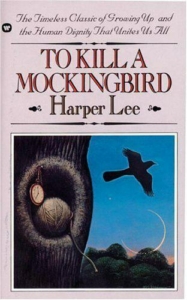
In the Pulitzer Prize-winning novel, a precocious, 6-year-old girl named Scout is living in the fictional town of Maycomb, Alabama with her big brother Jem and lawyer father Atticus Finch. Atticus has taken the case of a Black man, Tom Robinson, who has been falsely accused of assaulting a white woman. That summer, Scout’s reality is caught between the innocence of playing with her friend Dill and the reality of a changing world as embodied by their housekeeper, Calpurnia.
Parts of the novel are based on Lee’s lived experiences. She grew up in Monroeville, Alabama, where she died in 2016 at the age of 89. Her father was an attorney, Amasa Coleman Lee, who had taken on early civil rights cases. In one case in particular, he defended two Black men accused of murder, which he lost.
In 1960, Lee was a budding writer in New York City. She worked full-time for what is now British Airways and wrote for various literary magazines on the side. Her friend, novelist Truman Capote, recommended a literary agent for her to meet with, and after that meeting she quit her job at the airline and went to work on To Kill a Mockingbird.
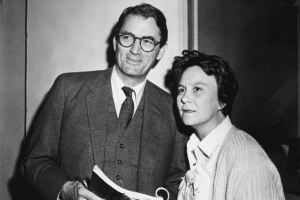
Actor Gregory Peck and novelist Harper Lee in 1962. Photo by Bettman/Corbis
At the time the novel was published, it was met with mixed reviews. The Atlantic called it implausible. The Chicago Tribune lauded it as a revelation. The Mobile Press-Register praised the novel for speaking to the times but warned of backlash from the Deep South. Two years later, the novel was adapted into an Academy Award-winning film with Gregory Peck as Atticus Finch. A stage adaptation of the novel has been performed in Monroeville since the 1960s.
Equipped with a perspective on how America has and has not changed in the last 60 years, Sorkin wrote a play that delves into the characters in ways the novel did not at the time. The child characters speak with the awareness of a changing world, so the play really does feel like it’s being told in retrospect. Scout is very clearly the protagonist. He also looked for the flaws in the novel’s most beloved character, Atticus.
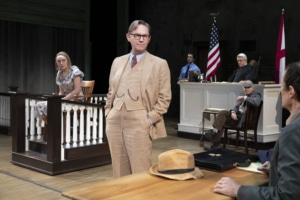
(L to R) Arianna Gayle Stucki (Mayella Ewell), Richard Thomas (Atticus Finch), Stephen Elrod (Bailiff), Richard Poe (Judge Taylor), Greg Wood (Mr. Roscoe), and Joey Collins (Bob Ewell) in To Kill a Mockingbird. Photo by Julieta Cervantes
In an interview with Salon, Sorkin said, “Atticus believes there is goodness in everyone. He excuses racism all over the place. One of the things Atticus keeps repeating is ‘I know these people.’ These are our friends and neighbors. Our family has lived here for generations. Sure, some of them are stuck in the old ways, but nobody is so far gone that that they’re gonna send an obviously innocent man to the electric chair. He’s wrong about that. I think that all of us, no matter where you are on the political and ideological spectrum have felt over the last few years ‘I thought I knew these guys.’ I had no idea that the person I was living next door to felt and thought things so different from what I did, so the play became relevant in that regard.”
For Emmy winner Richard Thomas (“The Waltons,” “Ozark” and “The Americans”), who plays Atticus, exploring the character’s evolution gives him more to work with onstage.
“Aaron Sorkin has done a lot of the work for me, because he’s taken Atticus off the pedestal,” Thomas said. “We should be grateful for people who try to do what’s right, but we can still be critical. We can interrogate his unassailable virtues, so he goes from being a man in a position of great comfort to discomfort. His loss of innocence is on a parallel course with the children’s throughout the play. Sorkin has created a teachable Atticus, not a man who’s dispensing wisdom, but he’s on a journey himself.”
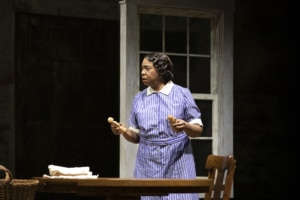
Jacqueline Williams (Calpurnia) in To Kill a Mockingbird. Photo by Julieta Cervantes
Thomas, who grew up in New York says he was first read To Kill a Mockingbird in middle school like many Americans. He says he recalls loving the book because the experience of childhood felt very real to him. But he also acknowledges something else.
“I could identify the good guys and bad guys, and what was unjust, frustrating and angry, but from a privileged perspective,” Thomas said. “It was before my own particular social awakening took place, so I was kind of an innocent reader of it.”
For Jacqueline Williams, who plays Calpurnia, she read her older brother’s copy of the novel in sixth grade. Williams grew up in Chicago, the daughter of parents who left the South during the Great Migration. She says the novel rang true to her because it reflected real experiences from her family.
“Those who know the book and film will not know Calpurnia in this way,” Williams said. “In that fleshing out, the relationship with the home, the kids, all of that is much clearer in this live version.”
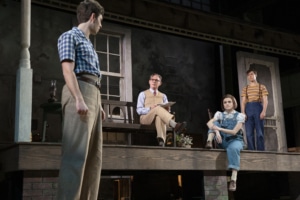
(L to R) Justin Mark (Jem Finch), Richard Thomas (Atticus Finch), Melanie Moore (Scout Finch), and Steven Lee Johnson (Dill Harris) in To Kill a Mockingbird. Photo by Julieta Cervantes
The contrast in their first experiences with the novel is similar to the difference in their characters’ lived experiences in the play. Sorkin takes the African American characters out of the periphery and gives them a voice and point of view, so Atticus and Calpurnia’s conversations are more frank and morally charged than those in the novel. Calpurnia is clearly suppressed by the same system that Atticus is trying to defend Tom against. But, at the same time, Atticus and Cal must function as a unit. Their dynamic drifts into one of parents trying to figure out how to raise children, but the power structure is clearly that of employer and employee.
This is part of what makes To Kill a Mockingbird a necessary text for the times. Like the characters, people are still learning how not to step on each other’s freedom.
“We still need this story. We still have a lot of work to do,” said Williams. “For many decades, a lot of racism was much more in your face in the South, but not so much in the North…Now, it’s all over the country. These killings, shootings and injustices are not new.”
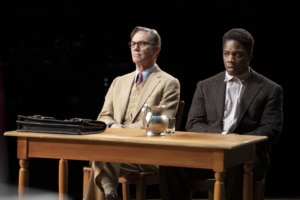
Richard Thomas (Atticus Finch) and Yaegel T. Welch (Tom Robinson) in To Kill a Mockingbird. Photo by Julieta Cervantes
In many ways, Lee foretelling the Civil Rights Movement through a child’s eyes proved to be an effective measure for the movement itself. The Children’s Crusade took place in Birmingham in 1963. High school and college students led the Freedom Rides to register African Americans to vote in the Deep South. Watching police and military officers turn dogs and fire hoses on children turned the tide.
The same is true now. The Occupy Movement, Black Lives Matter, #MeToo and the fight for climate consciousness are the unfinished business of the 1960s. During the 2020 Black Lives Matter demonstrations, watching millions of young people protest the murders of unarmed Black people pushed many institutions to reexamine their policies and practices related diversity, equity, and inclusion.
“As I grew up, they went from being characters in a book to being the world I was living in, and that’s part of the awakening,” Thomas said. “I’m proud of being a part of youth in the 60s, because when the awakening happened we were really involved. I’m happy to say that’s happening again. I have a 26-year-old son who’s on the barricades and it’s still real, it’s still true, and it jumps off the page… It’s the American story for better and for worse.”
DETAILS
To Kill a Mockingbird
Jan 24 – Feb 5, 2023 • Buell Theatre
ASL Interpreted, Audio-Described & Open Captioned performance: Feb 5 at 2pm
Tickets
